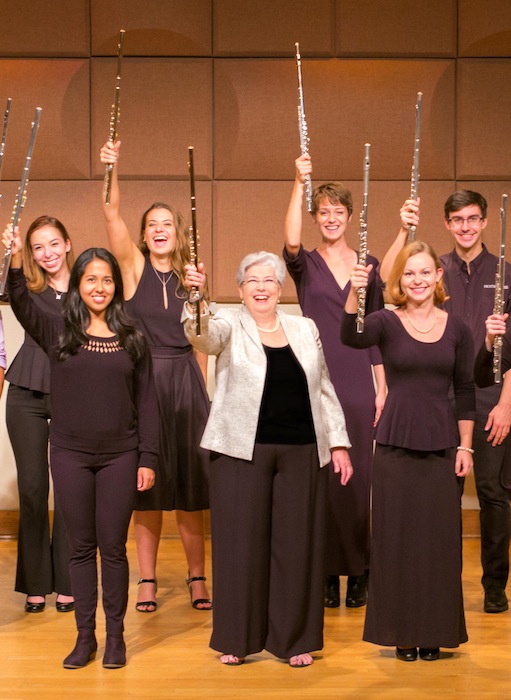Frost Flute Ensemble serves up musical variety at Festival Miami
An entire concert of music for flutes might seem like a tedious proposition but, on Tuesday night, Professor Trudy Kane and her students in the Frost Flute Ensemble presented a program at the 2017 edition of Festival Miami that managed to avoid monotony.
Originally conceived as an evening of scores by University of Miami faculty composers, the program was reconfigured to include Kane’s arrangements of operatic excerpts and a charming set of variations on a Scottish folk song when one of the commissioned works was not ready in time.
The UM Gusman Hall stage showcased eleven players from Kane’s studio, mostly conducted by Alexander Magalong, a third-year conducting student of Thomas Sleeper. Kane’s group has performed at flute expos and conventions in New York and Chicago during the past year.
Of the three faculty compositions on the concert, the clear winner was Sleeper’s Concerto for Flute and Flute Orchestra. Written in 2012, Sleeper’s ten-minute, three-movement score is both a virtuosic display piece and a brilliant kaleidoscope of tonal colors and shifting moods.
The former principal flutist of the Metropolitan Opera Orchestra, Kane is still a formidable musician. She tossed off the concerto’s darting opening flourishes with brio and stellar technique. Suggestions of neo-classicism contrast with more song infused melodic material.
The plaintive, nocturnal Arioso-Threnody finds the soloist traversing the instrument’s highest range in the manner of Debussy’s Syrinx. A profusion of dancelike thematic figures abound in the Ritmo finale. Kane’s silvery tone and agility along with Magalong’s fleet conducting did full justice to Sleeper’s creation.
If the other two pieces by UM composers were not quite on the same level, they still were skillfully crafted essays for a difficult instrumental combination.
Kane also took solo honors in Dorothy Hindman’s Mechanisms (2012), a brief musical evocation of gears and machines spinning and meshing. Hindman’s whirlwind series of short rhythmic motifs for soloist and eight players is complex yet entertaining with overlaying textures and off-the-beat solo lines. The witty conclusion finds all the players releasing a gust of wind. Magalong was particularly adept at keeping the ensemble cohesive during the tricky twists of melodic phrasing.
Frost Dean Shelly Berg’s The Wind, composed and premiered in 2015, opens with a Brazilian-flavored dance tune. At the piano, Berg took up a swinging jazz riff, followed by a quiet, foreboding central episode. Turning the flutes into a big band, Berg did an energetic keyboard improvisation before reprising the initial Latin theme. This fusion work finds Berg in his best, most relaxed manner and its eight-minute length seemed half as long.
The concert should have ended on that note. Instead former Frost tuba instructor Sam Pilafian’s transcription of the Nick LaRocca standard Tiger Rag was the party piece closer. Scored for flute, tuba and eleven-member ensemble, the arrangement was probably more fun to play than listen to. As performed by this contingent, the jazz classic seemed like a musical fish out of water. Replacing faculty member Aaron Tindall, originally scheduled to play the tuba part, Jens Peterson (a Tindall student) displayed fine sonority and ensemble skills.
Although not a member of the faculty, Ervin Monroe wrote his Loch Lomond – Theme and Variation for the Frost students in 2012. Monroe is the former first chair flute of the Detroit Symphony, an active publisher of flute music and winner of the National Flute Association’s Lifetime Achievement Award. His vignette is a total delight. The familiar folk melody is given successive pastoral, florid and rollicking treatment. A solo piccolo turns the tune into a merry gigue in particularly enchanting fashion.
Kane’s arrangements of the Overture to Smetana’s The Bartered Bride and the final trio from Strauss’ Der Rosenkavalier proved diverting. All the rapid inner voices in Smetana’s curtain raiser were well accounted for. Scored for flute quartet, Kane’s transcription of the Strauss ingeniously invests the glorious melodies with almost vocal solidity. Kane herself conducted the Strauss with vibrant lyricism and authority, reflecting decades of playing this music in the Met pit under James Levine.
Festival Miami continues with Steve Reich Masterpieces featuring pianists Timo Andres and Vicky Chow and percussionists Ji Hye Jung, Ian David Rosenbaum and Svet Stoyanov 6 p.m. Sunday at UM Gusman Concert Hall in Coral Gables. festivalmiami.com; 305-284-4940.
Posted in Performances
Leave a Comment
Wed Jan 25, 2017
at 1:14 pm
No Comments







